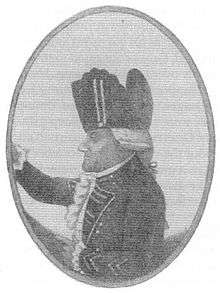Alexander Leslie (British Army officer)
| Alexander Leslie | |
|---|---|
 A caricature of Alexander Leslie | |
| Born | 1731 |
| Died |
27 December 1794 (aged 62–63) |
| Allegiance |
|
| Service/branch |
|
| Years of service | 1753–1782 |
| Rank | Major General |
| Battles/wars |
|
The Honourable Major General Alexander Leslie (1731 – 27 December 1794) was a major general in the British Army during the American Revolutionary War. He was the commander of the British troops at the Battle of Harlem Heights. He replaced Cornwallis as commander in the South in 1782.
Early life
Very little is known of his childhood. Leslie was born in England in 1731 to Alexander Leslie, 5th Earl of Leven, and was brother to Lady Mary Hamilton.
Military career
He enlisted in the 3rd Foot Guards of the British Army in 1753. He was promoted to lieutenant-colonel of the 64th Regiment of Foot in 1766.[1]
In 1775, before the American War of Independence broke out, he led troops to Salem, Massachusetts looking for contraband weapons. His advance was delayed by a standoff at a bridge, during which the colonists removed the weapons he was looking for. His force was eventually allowed to proceed, but found nothing of consequence, and was received with hostility during the expedition.
In 1776, Leslie was promoted to brigadier-general. He fought in the Battle of Long Island, the Landing at Kip's Bay, the Battle of White Plains and the Battle of Harlem Heights, the Battle of Princeton and the Siege of Charleston during the American War of Independence. At Princeton, his nephew, Captain William Leslie was mortally wounded.[2]
In 1780, he was sent to the Chesapeake Bay by Sir Henry Clinton in order to "make a powerful diversion in [Earl Cornwallis's] favor by striking at the magazines then collecting by the enemy ... for supplying the army they were assembling to oppose him."[3] He became major general in 1782 and was made Colonel of the 63rd (West Suffolk) Regiment of Foot the same year. He transferred in 1788 to be Colonel of the 9th (East Norfolk) Regiment of Foot to his death.
Death
On 27 December 1794, Leslie became deathly ill while traveling from Glasgow and died at the Beechwood House.[3]
Personal life
In 1760, he married Mary Tullidelph. She died in 1761 in childbirth. Their daughter survived.[4]
See also
References
- ↑ Fredriksen, John C. (2001). America's military adversaries: from colonial times to the present. Santa Barbara, California: ABC-CLIO. pp. 289–290. ISBN 1-57607-603-2.
- ↑ Fischer, David Hackett (2006). Washington's Crossing. New York: Oxford University Press. p. 331. ISBN 0-19-517034-2.
- 1 2 Webmaster (2 January 2011). "Alexander Leslie". Banastre Tarleton. Retrieved 5 August 2011.
- ↑ Essex Institute historical collections, Volume 38 By Essex Institute, Peabody Essex Museum (1902) p. 325
| Military offices | ||
|---|---|---|
| Preceded by Thomas Twisleton, 13th Baron Saye and Sele |
Colonel of the 9th (East Norfolk) Regiment of Foot 1788–1794 |
Succeeded by Albemarle Bertie, 9th Earl of Lindsey |
| Preceded by Francis Grant |
Colonel of the 63rd (West Suffolk) Regiment of Foot 1782–1788 |
Succeeded by George Waldegrave, 4th Earl Waldegrave |